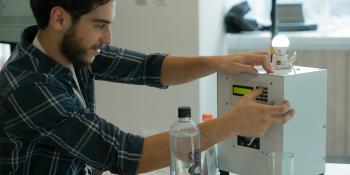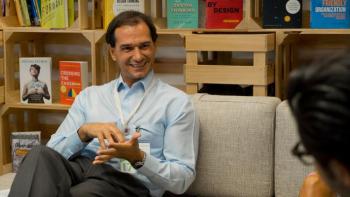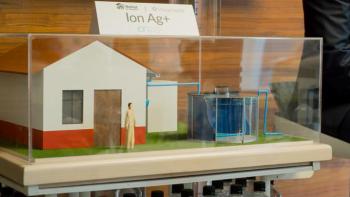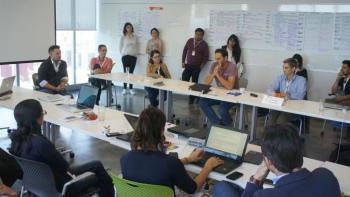
Vitaluz: Offering affordable electricity in remote areas
Yusef Jacobs was born into a family that could afford to give him a stable home and send him to great schools. “I didn’t do anything to deserve this life. It just happened for me,” Jacobs says. “Now I feel a very strong responsibility to take the advantages of the randomness that came my way to balance the scales for others.”
Jacobs sees Vitaluz as a great equalizer. It offers families living in areas without access to Mexico’s electrical grid the opportunity to purchase affordable electricity. People living in rural or remote areas now mostly rely on candles or diesel generators to power their appliances and lamps. Vitaluz leases to those consumers portable devices that store power generated through solar panels. They then purchase prepaid codes that allow them to tap into the power. “They pay for what they need,” Jacobs says. “They have the flexibility to pay per day, per week or per month.”
As it stands now, the Mexican government subsidizes the cost of electricity for consumers connected to the grid. “Families not on the grid that use diesel generators spend more in a month than I spend in two,” Jacobs says. “That means that the people who have less economic and financial resources are paying for the most expensive energy and for the lowest consumption. That is a social injustice.”
The name Vitaluz comes from the Latin word for life and the Spanish word for light. “Our slogan is ‘lighting life,’” Jacobs says, underscoring that electricity is indeed life-changing. Offering a way to purchase sustainable, affordable electricity means that families have more money to spend on their children. It also offers children more hours of light to read and study so they can do better in school and be more successful in life.
And solar energy is healthier than diesel-power generators for people and better for the environment. “We are not saying that electricity solves all of the problems in our society,” Jacobs says, “but it must be a stepping stone for a family or community to aspire to a better quality of life and development.”
Jacobs is only 24 years old but has long known that he would be an entrepreneur who helps people. “I truly feel that applying my skills and passions in trying to solve social problems is what I was made to do.”
“We are not saying that electricity solves all of the problems in our society, but it must be a stepping stone for a family or community to aspire to a better quality of life and development.”— Yusef Jacobs, CEO and founder of Vitaluz
In high school, Jacobs traveled extensively to other countries doing volunteer work. Among his favorite trips was the month and a half he spent building homes in the forest in Ecuador with an Indigenous community. He also worked in Lima, Peru, where he taught English in a school for blind children.
While he grew up and lives in Mexico City, Jacobs also traveled to remote areas in his own country that now make up his company’s target market. “Some people who live in Mexico City don’t really know Mexico. I really like to travel in my own country because it is so magical.”
Jacobs came up with the idea for Vitaluz during these visits. While in college earning his bachelor’s in engineering and physics, he worked for a company designing a product for communities without access to water. “When I started visiting these communities, I noticed they needed access to electricity. I thought I could help solve this.” He designed a prototype at home using a cookie box. “An hour of illumination with that system was cheaper than using candles,” he says.
The technology has come along way from those cookie box days. And now Jacobs is focused on scaling his company. The $50,000 investment from Habitat’s Terwilliger Center for Innovation in Shelter will allow Vitaluz to automate some of its processes, hire more people and map communities that could benefit from its products, Jacobs says.
Attending the ShelterTech workshop helped Jacobs think through some of the potential pitfalls going forward, he says. “The other entrepreneurs helped us identify risks. For instance, we don’t want to scale too fast and lose quality of service.
“You have to have the motivation to generate an impact in the world for people to develop their full potential. You also have to have a sustainable business.”
Subscribe to our monthly newsletter
Get the latest news, volunteer opportunities, DIY tips and other ways to get involved with Habitat for Humanity.


